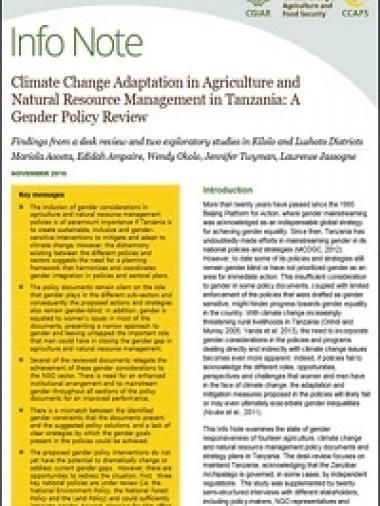Climate Change Adaptation in Agriculture and Natural Resource Management in Tanzania: A Gender Policy Review

More than twenty years have passed since the 1995 Beijing Platform for Action, where gender mainstreaming was acknowledged as an indispensable global strategy for achieving gender equality. Since then, Tanzania has undoubtedly made efforts in mainstreaming gender in its national policies and strategies (MCDGC, 2012). However, to date some of its policies and strategies still remain gender blind or have not prioritized gender as an area for immediate action. This insufficient consideration to gender in some policy documents, coupled with limited enforcement of the policies that were drafted as gender sensitive, might hinder progress towards gender equality in the country. With climate change increasingly threatening rural livelihoods in Tanzania (Orindi and Murray 2005; Yanda et al. 2013), the need to incorporate gender considerations in the policies and programs dealing directly and indirectly with climate change issues becomes even more apparent. Indeed, if policies fail to acknowledge the different roles, opportunities, perspectives and challenges that women and men have in the face of climate change, the adaptation and mitigation measures proposed in the policies will likely fail or may even ultimately exacerbate gender inequalities (Ncube et al., 2011).
Citation
Acosta M, Ampaire E, Okolo W, Twyman J, Jassogne L. 2016. Climate Change Adaptation in Agriculture and Natural Resource Management in Tanzania: A Gender Policy Review. CCAFS Info Note. Copenhagen, Denmark: CGIAR Research Program on Climate Change, Agriculture and Food Security (CCAFS).